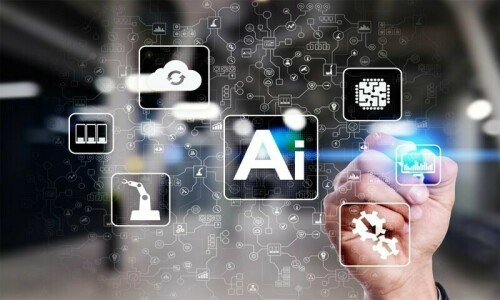AUSTIN: Proponents of artificial intelligence are placing bets that the technology will aid in resolving some of humanity’s most pressing issues, such as war and global warming, but these may be lofty goals for the time being.
It isn’t necessary to say to AI, “Hey, this is a sticky situation. How would you respond? and AI is saying, ‘Well, you need to radically rebuild this portion of the economy,'” according to computer science professor Michael Littman of Brown University.
Littman was in Austin, Texas, for the South By Southwest (SXSW) arts and technology festival. He had just finished off a panel discussion about the possible advantages of artificial intelligence.
It’s just a pipe dream. It has elements of science fiction. The majority of what people are doing is attempting to apply AI to certain issues that they are already handling in an effort to increase efficiency. “Merely pressing this button won’t make everything right,” he stated.
With their auspicious titles
The panels draw large audiences, but they frequently have more practical goals, like pitching a product. With topics like “How to Make AGI Beneficial and Avoid a Robot Apocalypse” and the constant presence of tech companies, they are quite popular.
Microsoft CEO Simi Olabisi highlighted the advantages of AI at a conference titled “Inside the AI Revolution: How AI is Empowering the World to Achieve More” and highlighted the technology’s capabilities on Azure, the company’s cloud service.
Maybe a customer called in irate, but after they ended the call, they were incredibly pleased when call centers used Azure’s AI language capability. According to her, Azure AI Language is able to effectively convey that sentiment and inform businesses about the emotions of their clientele.
“More intelligent than people”
For many years, there has been a concept of artificial intelligence, which involves algorithms that can analyze vast amounts of data and automate tasks.
But with the success of ChatGPT, the generative AI interface introduced by OpenAI, the now-famous AI start-up mostly financed by Microsoft, it took on a whole new dimension last year.
CEO Sam Altman of OpenAI states that the company aspires to create artificial “general” intelligence, or AGI, which will be “smarter than humans in general” and “elevate humanity.”
Talk about “when” rather than “if” artificial intelligence (AI) becoming a reality was prevalent at SXSW. The AGI Society’s and SingularityNET Foundation’s chief scientist, Ben Goertzel, projected that general artificial intelligence will arrive by 2029.
“Because this AI can modify its source code, once you have a machine that can think as well as a smart human, you’re at most a few years from a machine that can think a thousand or a million times better than a smart human,” Goertzel stated.
Donning a faux-fur cowboy hat with a leopard print, he promoted the creation of artificial general intelligence (AGI) that possesses “compassion and empathy” and is incorporated into robots “that look like us” to make sure these “super AIs” get along with people.
Desdemona, a humanoid robot that uses generative AI, was created by Hanson Robotics inventor David Hanson, who also discussed the advantages and disadvantages of AI with superpowers.
According to him, “positive disruptions from AI can help solve global sustainability issues, although people are probably going to be just creating extremely effective financial trading algorithms.”
While pointing out that humans are already doing a “fine job” of playing “existential roulette” with nuclear weapons and by triggering “the fastest mass extinction event in human history,” Hanson expresses his dread of the instability that AI may bring. However, “it’s possible that the AI contains wisdom seeds that sprout and develop into new kinds of wisdom that can improve us,” he stated.
“Not quite there”
AI proponents first suggested that AI should speed up the development of new, more environmentally friendly medications or materials.
Although “we’re not there yet. According to Roxanne Tully, an investor at Piva Capital, “in a dream world, AI could handle the complexity and randomness of the real world and… discover completely new materials that would enable us to do things that we never even thought were possible.”
AI is already showing its value today in systems that warn of forest fires and tornadoes, for instance.
During a panel discussion titled “Can AI Solve the Extreme Weather Pandemic?” Rayid Ghani of Carnegie Mellon University emphasized that in the event of a pandemic, people still need to be evacuated or convinced to vaccinate themselves. “This issue was brought about by us. AI didn’t create inequality; humans did, and I believe AI can somewhat mitigate it. But only if people want to use it to address the problem, according to Ghani.
SOURCE: DAWN NEWS





